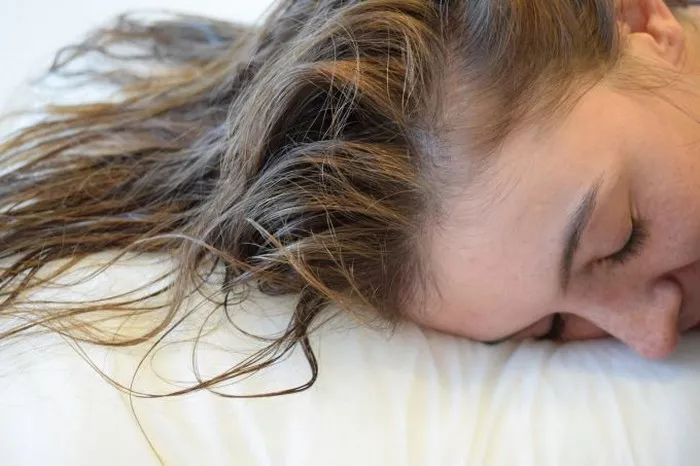For some people, mornings are a chance to embrace the day with a refreshing shower and a hearty breakfast. For others, the appeal of an extra few minutes of sleep can be irresistible. This often means delaying personal care routines until nighttime, including washing your hair. However, if you’ve ever washed your hair just before bed, you may have wondered whether it’s safe to sleep with wet hair—or if doing so could cause damage.
Experts warn that sleeping on wet hair can have several negative consequences for your hair health. While it might seem like a small inconvenience, the risks of damage are real. Here’s a breakdown of why sleeping with wet hair is problematic, as well as tips for maintaining healthy hair while still getting some extra rest.
Should You Sleep on Wet Hair?
The short answer? No. According to Dr. Michele Green, a board-certified cosmetic dermatologist based in New York City, it’s always better to dry your hair before going to bed to protect it and maintain its health.
When your hair is wet, it’s much more vulnerable to damage. Dr. Green explains that moisture weakens the structure of hair strands, making them more prone to breakage. Wet hair is significantly more fragile than dry hair, and sleeping on it can exacerbate this vulnerability.
Hair Breakage: The Most Common Concern
One of the most immediate effects of sleeping on wet hair is hair breakage. Penny James, a board-certified trichologist and founder of the Penny James Trichology Center, explains that damp hair is prone to damage when it’s subjected to the friction of pillowcases and sheets. This constant friction can weaken the hair shaft, causing strands to break, especially for individuals with finer or more fragile hair.
Dr. Green adds that wet hair is more elastic than dry hair, but this increased elasticity comes at a cost—it weakens the protein structure of the hair. When this weakened hair comes into contact with the pillow, it faces an increased risk of breakage and split ends.
Microbiome Disruptions: The Hidden Danger
Your pillowcase isn’t just a surface that supports your head at night—it can also be a breeding ground for bacteria and fungi. According to James, a damp pillow can create the perfect environment for microbial growth, including yeast and bacteria. This can disrupt the health of your scalp’s microbiome, leading to a variety of scalp conditions.
Dandruff, Dermatitis, and More
The accumulation of bacteria and fungi on a wet pillow can contribute to scalp problems such as dandruff, seborrheic dermatitis, psoriasis, and folliculitis. Dr. Green explains that these conditions cause inflammation on the scalp, which can lead to itchiness, redness, and in more severe cases, hair loss. In short, sleeping with wet hair doesn’t just lead to breakage; it can also contribute to thinning hair and other scalp issues.
Tips for Sleeping with Wet Hair
If you’re someone who prefers to wash your hair before bed, there are a few strategies you can adopt to minimize the risk of damage.
Air Dry Your Hair
The simplest and most effective way to prevent damage is to air dry your hair as much as possible before going to bed. Penny James advises that individuals with sensitive scalps or those prone to irritation will notice a significant improvement in scalp health when they allow their hair to dry before lying down.
Blow Dry with Care
If you must use a blow dryer, Dr. Green says it’s fine as long as you take precautions. Always apply a heat protectant to your hair before using a blow dryer, and make sure to set it to a low heat setting. Keep the dryer at least six inches away from your hair to avoid excessive heat exposure that could cause further damage.
Use Silk for Protection
If drying your hair is not an option, there are alternative methods to help protect your hair while you sleep. Silk and satin products—like pillowcases, bonnets, or scrunchies—can prevent damage by reducing friction. Dr. Green notes that silk has a low friction rate, which prevents the hair from snagging and breaking.
Alex Drummond, known for her beauty insights, calls silk pillowcases “life-changing” for anyone looking to protect their hair while they sleep. Not only does silk help reduce breakage, but it also minimizes the formation of tangles.
Tie Your Hair Up
Another tip is to wear your hair in a protective style such as braids or a loose ponytail. Dr. Green recommends using a silk scrunchie to keep your hair tied up. This will reduce friction and prevent tangling, further protecting your hair from breakage.
Conclusion
While it may be tempting to skip the blow-dryer and head straight to bed after washing your hair, experts strongly advise against sleeping with wet hair. The increased risk of breakage, microbial growth, and scalp irritation can have lasting effects on your hair’s health. By following a few simple steps—such as air drying, using protective fabrics, or tying your hair up—you can ensure that your hair remains healthy, strong, and free from damage, even after a late-night wash.
Related topics:
- Throwback Photo Suggests Trump’s Hair Concerns Date Back Further Than Expected
- George Sampson’s Transformation: Tattoos, Hair Transplants, and Personal Growth
- From Insecurity to Empowerment: How a Hair Transplant Transformed My Life


